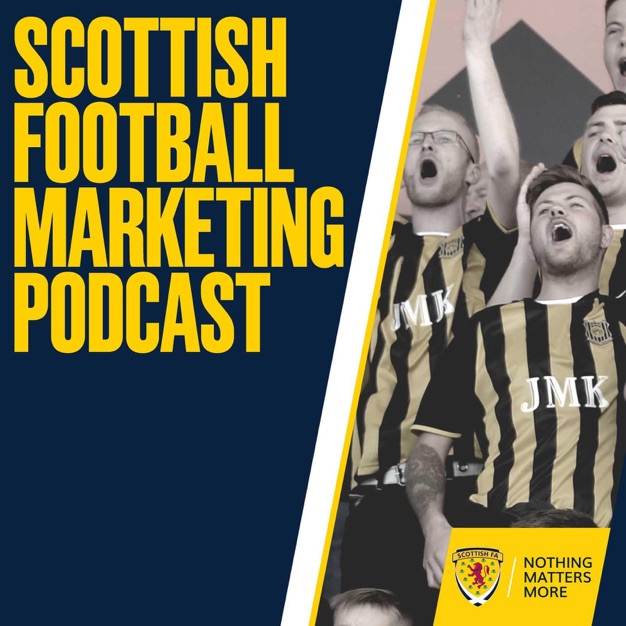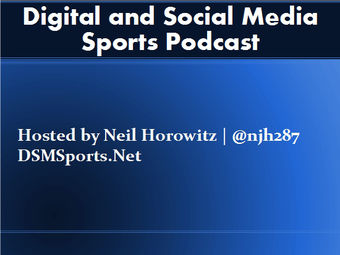
Sports Content Strategy with MrRichardClarke: Exploring sports content, journalism, digital and social media
MrRichardClarke
An exploration of sports content, storytelling, digital and social media. Speaking to players, executives, coaches, creators, journalist and specialist about their sporting passions.
- David Tossell: How one-day cricket changed the game
In 2023, one-day cricket enjoyed its 60th birthday.
David Tossell has written a book on the evolution of the format. He describes those early days as “nicely naïve”. But, at the same time, they were the foundation for every major innovation in cricket ever since.
These days, the 50-over game is under an existential threat due to the rise of T20. Can it survive, is it worth saving and what would be its legacy?
We discussed all this and more on this episode of Sports Content Strategy
Topics
Why one-day cricket first started? Its early evolution
The formative years of the Gillette Cup
The influence of television on the growth of the game
The cultural importance of the Sunday League
The way it has changed the game’s tactics
The importance of Pakistan and India’s World Cup victories
The game that led to the Duckworth Lewis
Decline and the need for T20
How T20 has affected 50 over cricket
Where the 50-over game fits into the future of cricket
The legacy of one-day cricket
6 August 2023, 1:39 pm - 1 hour 2 minutesRicardo Fort: Sports Sponsorship 101
Ricardo Fort has led the sponsorship strategy for brands at World Cups and Olympics.
After a long, successful career with the likes of Coca-Cola and Visa, he has set up his own consulting firm. In this podcast, Ricardo gives straight answers to key questions in sports sponsorship and outlines how content fits in. This is a sophisticated 101 for anyone interested in working in the commercial department at a major sports organisation.
Is sponsorship just about "hanging out with the cool kids"
Does there always have to be a positive financial return?
"The brands want to be relevant, most brands are irrelevant in the lives of people"
Are brand sponsorship decisions emotional?
The best sports sponsorship deal he did at Coca-Cola - The case study of the FIFA World Cup trophy tour
Measurable and immeasurable benefits
What are the Key KPIs and the less important metrics for sponsors?
How can brands be sure about the impact of a sponsorship?
Sponsoring a tournament or event as opposed to a team. What are the differences?
Moving from badging and advertisement to 'clever content'
The value of creating a content strategy that stands out
The comparison between NFL and European football in accommodating sponsors
In NFL, the owner gets the trophy before the players - what does that tell us?
Why the fans police any over-commercialisation in Europe
"All sponsors say they want data, but very few know what to do it."
How can you make a partnership scandal-proof?
How to do your due diligence and protect against future problems
The fans' voice in sponsorship
Sponsorship in gaming and the Alex Hunter deal
26 May 2022, 4:05 pm - 1 hour 2 minutesAlex Phillips - The most influential football administrator you' ve never heard of
Alex Phillips does not look or sound like a revolutionary but his ideas could shake up football.
He spent 15 years at Uefa, including a couple as Head of Compliance and Governance. He was seconded to the Asian Football Confederation for three years and now leads the World Football Remission Fund, a FIFA body administrating how money "stolen from the game" should be returned for its overall benefit.
Phillips has been described as "the most influential football administrator you have never heard of". Certainly, he has an analytical eye and passion for reform.
In this podcast, we discuss good governance, the ramifications of the failed Super League project, educating owners and fans, setting examples and, of course, content
TOPICS
His views on the Super League between its collapse and now - "a great fragmentation"
Uefa's mistake of not making co-efficient qualification 'a red line'
Having the same people governing conflicting tasks
Why regulatory bodies are "not up to the job"
Linking financial control to regulation and its inherent problems
Not restricting finances but restricting player numbers instead
Changing payers and coach's behaviour
Using broadcasters to educate players and fans
"Leadership time is often spent chasing money rather than on sporting issues"
How to change a football reputation - the example of German refereeing
The differing concepts of "cheating"
The values of football's myths and stories. And why owners need to be educated
How television does football's marketing job
The challenge to retain younger audiences whose frame of reference is different
The concept of scarcity in creating sporting interest - 'hats off to the Champions League?"
Working properly with partners and sponsors to grow a sport
Alex's three recommendations to grow football
9 May 2022, 4:00 pm - 49 minutes 14 secondsClaire Nelson: Scottish netball and creating the ultimate female spectator sport
The challenges facing netball are different to other sports. While we have seen growth in women's football, tennis and boxing in recent years, it has always occurred through the lens (or perhaps in the shadow) of established male forebears. Netball does not have this baggage. Its story, product and message can be tailored specifically toward women and girls.
Claire Nelson is CEO of Netball Scotland and the Strathclyde Sirens. Her focus is to capitalise on this advantage and carve out a unique niche for the sport north of the border. In this podcast, we discuss the key areas in which she is concentrating - sponsors, player development, marketing, messaging, media deals and, of course, content.
TOPICS
The overall landscape of netball
Adapting netball's story and building a sport and lifestyle brand
Working against established cultural habits
Why women's sport is "not a nice-to-have but makes economic sense"
How the storytelling focus changes for a 'female sport'
The untapped audience of women
The differences in the female fan - different message, spending patterns and the 'guilt factor'
Not limiting their vision to competition and 'bums on seats'. "There's sportainment and lifestyle"
The Fast Fives concept
Creating player pathways
Comparisons with women's football. "The men's game has decided to invest more into the women's game"
Moving to the Women's Super League from the 'amateurish' of environment leisure centres and into arenas
The influence of the Commonwealth Games this summer
The one thing netball most needs
24 April 2022, 3:08 pm - 56 minutes 32 secondsTom Dunmore: Launching Major League Cricket
For the past two decades, cricket has been trying to cross new boundaries. Previously, its global footprint mirrored its past as the game of the British Empire but, in recent years, countries like the Netherlands, Namibia and Afghanistan have risen to prominence
In the next 10 years, the game will try to cross its biggest and most important new frontier - the USA. They have been awarded co-hosting rights for the 2024 T20 World Cup and a buzz is building around the chances of inclusion in the Olympics in Los Angeles four years later.
Minor League Cricket started last season and its Major League big brother begins in 2023. Tom Dunmore is VP of Marketing for both tournaments. In this podcast, we discuss the story so far, the challenges they face and the vision for success.
TOPICS
Where is the landscape of cricket in the US right now?
The reliance on the south Asian audience
Why Major League Cricket is the ‘tip of the spear’ but they are looking to grow a sport
‘It is a unique opportunity but the USA is not afraid to take a deep dive and make a big bet’
The ‘feel’ of a Minor League Cricket game and having 3,000 fans at the final
The 35 professionals brought in as mentors to raise the standard
The authenticity and integrity of the game in the wide variety of US climate conditions
Learning from the development of Major League Soccer - stadium build, fan experience, getting priority dates for fixtures, ownership models
“We’ll be able to have world-class players right away, up there with the CPL and BBL”
The different investment models
Content strategy for franchises
Using a YouTube influencer and video games as tools
Being one of many ‘Major League” sports trying to get a foothold in the US
Whose audience are they going to take?
Is the push for the 2028 Olympics realistic?
5 March 2022, 6:13 pm - 43 minutes 21 secondsBrian Jacks: Olympian, Superstar and maybe... UFC coach
Brian Jacks was a household in the UK in the 1980s. The pinnacle of the judo player’s sporting success came when he won a bronze medal at the Munich Olympics in 1972. But a few years later he would become much more famous as the UK and European champion in Superstars, a popular television programme that saw the best athletes of the day compete in events outside their niche. The show grew throughout the world to become perhaps the first modern example of how sporting heroes could cross into mainstream media, with all its financial benefits, through light entertainment television.
Now living in Thailand, Jacks talks about his motivations, how he leveraged his Superstars fame, his rivalry with Daley Thompson and why he’d love to be a grappling coach in UFC
Podcast partner: Sports Tech Match - Simplifying Sports Tech Procurement
TOPICS
Was his mental strength the key to his success, not his physical strength
The importance of a challenge
Making sure you have the grit to make his career ‘gambles’ pay-off
Why Brian believes Team GB judo is ‘soft’
“You have to see what failure is to see what achievement is”
Getting on to Superstars
How he monetised his stardom
Did you he enjoy the fame?
His approach to Superstars - breaking down the problem?
How do you find his ability to rise to a challenge?
Would he have fancied turning to UFC?
Coaching Neil Adams and punching him in the face as motivation before the biggest bout of his career
The power of community in his success
Being from a Black Cabbie family
The rivalry with Daley Thompson
Brian’s life now - his fitness, his hotel and charity work
Feeding over 32,000 people who were starving as a result of the pandemic
Running his apartment block business
His ambitions now
11 February 2022, 11:07 am - 1 hour 11 minutesGrant Russell: Find a unique story, stick to the story, live the story
Motherwell FC have lifted only one trophy in the past 30 years. However, off the pitch, they beat off competition from Manchester United, Everton and Leicester to win the Best Digital/Social Media category at the Football Business Awards this year.
Grant Russell is the club’s Head of Brand, Digital and Communications. In this episode, he talks about the thinking, discipline and creativity that have gone into building a stand-out story for an otherwise overlooked Scottish team.
This is a deep dive into content strategy and, like me, Russell believes in cutting through clutter with a strict, realistic yet progressive vision for storytelling.
TOPICS
“We exist to improve people's lives” is Motherwell's Twitter bio. What does that really means?
Addressing key societal issues in the locality like male suicide and child poverty
Asking deep questions about what defines a supporter. "We are all purpose-driven whether we realise it or not"
Identifying you purpose and supporter ‘triggers’ at your club
"Having done all this work the most important thing is never to deviate from your story"
What stories did Motherwell leave out?
Are the fans onboard?
Are Motherwell ‘a club with a cause’ or ‘a cause with a club’?
Building target audiences? And who did they decide not to target?
Creating acquisition funnels and 'knowing when to pounce’?
The advantages and disadvantages of combining the brand, communications and marketing functions
The four narratives Motherwell focus on. ‘Hit one pillar and the guiding pillars underneath’.
Handling the commercial imperatives and turning down the 'wrong' partners
Calculating value per 1,000 followers
The basis of the strategy - balancing data with feel/tone
Defining a season narrative each year. "We know what we are. There is no point lying about it."
The approach of the outside media to the club-created story
Taking players out into the community and finding a story that fits with them
The effect of Covid on the community spirit within the club
Do the hardcore Motherwell fans get it?
Using the colours to their fullest
What is next on the agenda?
The huge advantage of building trust
The effect of winning a major award for content
17 December 2021, 11:20 am - 1 hour 3 minutesEd Warner: How to run a modern sport
Ed Warner has something to say.
After a decade as chair of UK Athletics (including the 2017 World Championships in London) and a few years in his current role with GB Wheelchair rugby, he is well-placed to comment on the stresses and strains of running a modern sport. Warner wrote a book, Sports Inc, on the subject a few years ago and has just started a blog of the same name.
In this podcast, we discuss many of the key issues required to steer a sporting ship towards success: leadership styles, funding models, changing content strategies, marketing, elite sport v participation, bringing in private equity funding and his open application for the role of ECB chair.
TOPICS
Why write the Sports Inc blog?
What qualities do you need to run a sport as a leader and what qualities do you need in your executive team?
"These jobs are advertised as 25 days a year but it needs three days a week!" "You have to be in love with the sport"
In UK sport, is there a hangover from the amateur/blazer days?
The success of lottery funding in the UK
Changing the funding model for sport
Equipping Olympic athletes for life on the back of their '15 minutes of fame'
Using content to create an ongoing story that brings value and revenue
The power of a focussed plan that targets the "right eyeballs"
Why triathlon is crossing over successfully
Allowing greater conflict in the sporting narratives. Or at least not being scared of it
"Sport is theatre where you don't know how the story ends"
Writing an open application for the role of ECB chair
The Hundred - Ed likes it, I hate it
The link between elite sport and participation. Ed's concerns for the future of rugby and cricket
The private equity question - can an organisation properly innovate without them? But are their goals inherently different to sport?
How to build back better after Covid-19
Learning from Barry Hearn
18 November 2021, 2:36 pm - 1 hour 11 secondsGeorge Crabb: How to create the perfect sports app
Given its increasingly strategic importance within sports business, it is surprising how many rights-holders produce sub-standard apps.
To try and solve this issue, I spoke to George Crabb, Managing Director at The Other Media. This well-established digital agency have a rich history in working with rights-holders to create mobile applications of the highest quality. We collaborated to refashion the Arsenal app a decade ago but usage, connectivity, monetisation and the art-of-the-possible have moved forward rapidly since then.
In this extensive podcast, we delve into the most basic questions in the field, explore how rights-holder should approach the development of their offering and what could be coming in the future
Why do you need a specific app? "The answer lies with the growth of mobile use and functionality." For the clubs, it is about fan engagement and revenue
The benefit of keeping fans in your ecosystem and the data play
Why the app is the centre of the ecosystem now
"Yes clients still come demanding a replication of the website"
The key tool of push notifications
Has ticketing via an app made a big leap made in lockdown and will it persist?
What strategic issues does an organisation need to have in mind when starting the app process
The problem of connectivity in stadia
Bugbears - linking social media with your app, apps as a set of webpages - and ways around them
Free, data and sign-up models
Personalisation and segmentation of content - what is the state of the art?
Integration with CRM systems
The importance of content
Price
George's examples of best practice
Creating community
7 October 2021, 9:49 am - 53 minutes 16 secondsVijhay Vick: Content strategy for teams who win the league every year
It is the content strategy problem we would all like to have. How do you create a story about a team that has won the league seven seasons in a row (and an eighth is expected to follow soon)? Johor Darul Ta'zim (or JDT) are a team on a mission. They were re-formed in 2013 with a new nickname, the Southern Tigers, under the guidance of the Crown Prince of Johor. They won their first title a year later and the AFC Cup (the Asian version of the Europa League) 12 months after that. They have gone on to dominate Malaysian football. But their tone on social media has brought them as much attention as their success. Now they are looking to internationalise their brand and grow their partnership portfolio with the likes of Aston Martin and Unicef. Vijhay Vick, the Head of Content, is leading their strategy. In this podcast, he discusses his approach to JDT's unique position.
TOPICS
The recent history of JDT
How they have grown on social media
Capitalising on the huge Indonesian market
Being brazen about their success
Why they are "the most hated team in Malaysia"
What would signing a world-renowned player like Radamel Falcao do for the league and the club?
Having a partnership with the likes of Aston Martin
The Malaysian League in general - crowds, TV audience, etc
The football audience is very split - some love foreign football, some love Malaysian football. They are very different groups.
How JDT's PR strategy has started to bridge the gap
JDT's social media strategy - "It's 80 per cent Facebook. The Twitter space is toxic."
Dealing with that toxicity on social media
The role of CSR in JDT’s strategy
The link with Unicef
His content and communications team at JDT
The kit reveal video that received a million views in two days
The crucial buy-in from the top
Being realistic about what JDT can achieve
27 August 2021, 12:23 pm - 51 minutes 40 secondsAlison Kervin: Sports Writing, the Mail and the female pioneer
Alison Kervin is a pioneer in women's sports journalism. She was the first female editor of Rugby World and the first female sports editor of a UK national newspaper. Kervin's eight-year spell at the Mail on Sunday has just come to a close so he has started up a media agency for athletes. Oh, and she is a successful novelist too.
If she was editing this piece, undoubtedly 'the line' would centre on her gender-based breakthroughs. After all, that is why she was awarded an OBE. But Kervin's spell at the Mail has coincided with huge disruption in the newspaper industry, sparked by digital transformation. She reveals the skills and knowledge she has had to acquire for the 'new' media age and the core abilities every storyteller still requires.
TOPICS
Writing a sports reporting book back in the 1990s
What has changed and not changed in sport reporting
The skill of a sports writer. Does it garner respect?
The feature writer's evolution. What worked and what did not for her.
Coping with the management of athletes in modern sport
What qualities meant it was she who made the key breakthroughs as a female sports journalist
Did the door slam behind her?
Is the lack of female sports journalists down to confidence?
The growth of digital in newspapers since she took over at the Mail on Sunday sports editor in 2013
Concerns of speed being much more important than quality in the digital age
The problem of SEO-based 'churnalism' driven by clicks
The shortening of feedback loops
The difficulty of shareability
How does Alison measure the success of female sports journalism these days?
Writing novels under the pen name of Bernice Bloom - mimicking the box-set mentality
Starting a media agency - knowing what a journalist would want
* This episode of Sports Content Strategy is brought to you by the Digital Marketing & Analytics for Sports Professionals - Your road to digital excellence in sports. Online course starts August 31
10 August 2021, 7:49 pm - More Episodes? Get the App
Your feedback is valuable to us. Should you encounter any bugs, glitches, lack of functionality or other problems, please email us on [email protected] or join Moon.FM Telegram Group where you can talk directly to the dev team who are happy to answer any queries.
 SB Weekly - the sport business podcast
SB Weekly - the sport business podcast
 Leaders Sport Business Podcast
Leaders Sport Business Podcast
 Digital Sport Leaders with Dan McLaren
Digital Sport Leaders with Dan McLaren
 Scottish Football Marketing Podcast
Scottish Football Marketing Podcast
 SportsPro Podcast
SportsPro Podcast
 Digital and Social Media Sports Podcast
Digital and Social Media Sports Podcast